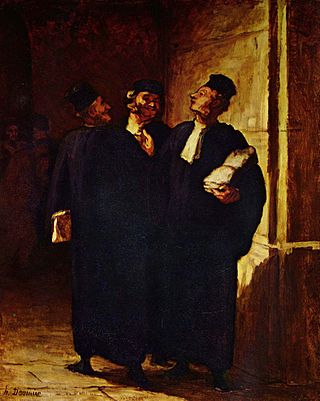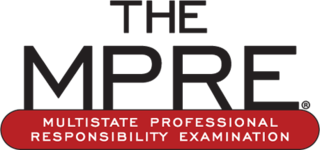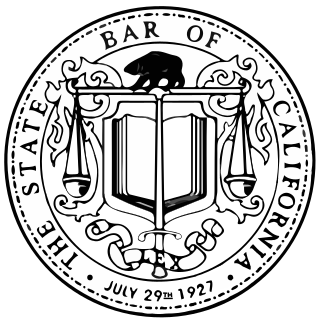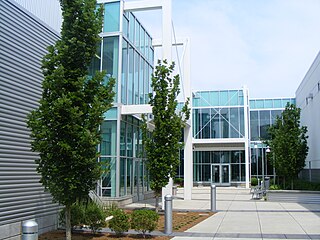
An advocate is a professional in the field of law. Different countries and legal systems use the term with somewhat differing meanings. The broad equivalent in many English law–based jurisdictions could be a barrister or a solicitor. However, in Scottish, Manx, South African, Italian, French, Spanish, Portuguese, Scandinavian, Polish, Israeli, South Asian and South American jurisdictions, "advocate" indicates a lawyer of superior classification.
An attorney at law in the United States is a practitioner in a court of law who is legally qualified to prosecute and defend actions in court on the retainer of clients. As of January 1, 2023, there were 1,331,290 active lawyers in the United States. In terms of absolute numbers, the American legal profession was the largest in the world as of 2015, and it is thought to be the largest in the world in proportion to domestic population. A 2012 survey conducted by LexisNexis Martindale-Hubbell determined 58 million consumers in the U.S. sought an attorney in the last year and that 76 percent of consumers used the Internet to search for an attorney.

Matura or its translated terms is a Latin name for the secondary school exit exam or "maturity diploma" in various European countries, including Albania, Austria, Bosnia and Herzegovina, Bulgaria, Croatia, Czech Republic, Hungary, Italy, Kosovo, Liechtenstein, Montenegro, North Macedonia, Poland, Serbia, Slovakia, Slovenia, Switzerland and Ukraine.

Admission to the bar in the United States is the granting of permission by a particular court system to a lawyer to practice law in the jurisdiction. Each U.S. state and jurisdiction has its own court system and sets its own rules and standards for bar admission. In most cases, a person is admitted or called to the bar of the highest court in the jurisdiction and is thereby authorized to practice law in the jurisdiction. Federal courts, although often overlapping in admission standards with states, set their own requirements.

In law, the bar is the legal profession as an institution. The term is a metonym for the line that separates the parts of a courtroom reserved for spectators and those reserved for participants in a trial such as lawyers.
A bar examination is an examination administered by the bar association of a jurisdiction that a lawyer must pass in order to be admitted to the bar of that jurisdiction.
A patent attorney is an attorney who has the specialized qualifications necessary for representing clients in obtaining patents and acting in all matters and procedures relating to patent law and practice, such as filing patent applications and oppositions to granted patents.

The Multistate Professional Responsibility Examination (MPRE) is a 120-minute, 60-question, multiple-choice examination designed to measure the knowledge and understanding of established standards related to a lawyer's professional conduct. It was developed by the National Conference of Bar Examiners and was first administered in 1980.
The National Unified Legal Professional Qualification Examination (国家统一法律职业资格考试), commonly abbreviated as Legal Exam, is the national bar examination of the People's Republic of China. This examination is administered by the Ministry of Justice. According to the law, those who serve as judges, prosecutors, lawyers, notaries, legal advisors, legal arbitrators, and those in government departments who are engaged in the review of administrative penalty decisions, administrative reconsideration, and administrative rulings are required to pass the legal professional qualification examination.

The State Bar of California is an administrative division of the Supreme Court of California which licenses attorneys and regulates the practice of law in California. It is responsible for managing the admission of lawyers to the practice of law, investigating complaints of professional misconduct, prescribing appropriate discipline, accepting attorney-member fees, and financially distributing sums paid through attorney trust accounts to fund nonprofit legal entities. It is directly responsible to the Supreme Court of California. Its trustees are appointed by the Supreme Court, the California Legislature, and Governor of California. All attorney admissions are issued as recommendations of the State Bar, which are then routinely ratified by the Supreme Court. Attorney discipline is handled by the State Bar Office of Chief Trial Counsel, which acts as prosecutor before the State Bar Court of California. The State Bar has been cited for its corrupt practices during the 21st century, and is subject to reforms issued by its governing body, the California Supreme Court.
An admission to practice law is acquired when a lawyer receives a license to practice law. In jurisdictions with two types of lawyer, as with barristers and solicitors, barristers must gain admission to the bar whereas for solicitors there are distinct practising certificates.

Nashville School of Law, is a private law school founded in 1911. The school's students attend classes at night on a part-time basis.
In order to be registered as a patent agent or patent attorney in the United States, one must pass the United States Patent and Trademark Office (USPTO) registration examination, officially called the Examination for Registration to Practice in Patent Cases Before the United States Patent and Trademark Office and known informally as the patent bar.
The Philippine Bar Examinations is the professional licensure examination for lawyers in the Philippines. The exam is exclusively administered by the Supreme Court of the Philippines through the Supreme Court Bar Examination Committee.
In the law of the United States, admission on motion refers to a procedure by which an attorney admitted to practice in one state or territory may obtain admission to practice in another state or territory without having to sit for the other jurisdiction's bar examination. Therefore, attorneys seeking admission on motion can be admitted to a jurisdiction without having to undergo any additional testing, except where the Multistate Professional Responsibility Examination (MPRE) is required. Instead, applicants simply file a motion or application with the state supreme court, board of bar examiners, or state bar association of the other jurisdiction, which typically must be accompanied by certificates of good standing from all other jurisdictions in which they are admitted and sufficient personal information to facilitate a background check of good moral character.

The Common Law Admission Test (CLAT) is a centralized national-level entrance test for admissions to the 25 out of 27 National Law Universities (NLU) except NLU Delhi and NLU Meghalaya. CLAT was first introduced in 2008 as a centralized entrance examination for admission to the National Law Schools/Universities in India.
The Arizona Bar Exam is the exam administered by the Admissions Unit of the Certification and Licensing Division of the Supreme Court of Arizona. A satisfactory score on the Arizona Bar Exam is one of numerous requirements for admission to be admitted as an attorney in the State of Arizona.
The South Carolina Bar is the integrated (mandatory) bar association of the U.S. state of South Carolina.

The Florida Bar is the integrated, or unified bar organization for the state of Florida. It is the third largest such bar in the United States. Its duties include the regulation and discipline of attorneys and the governance of Florida Registered Paralegals.

In the United States, those seeking to become lawyers must normally pass a bar examination before they can be admitted to the bar and become licensed to practice law. Bar exams are administered by states or territories, usually by agencies under the authority of state supreme courts. Almost all states use some examination components created by the National Conference of Bar Examiners (NCBE). Forty-one jurisdictions have adopted the Uniform Bar Examination (UBE), which is composed entirely of NCBE-created components.








